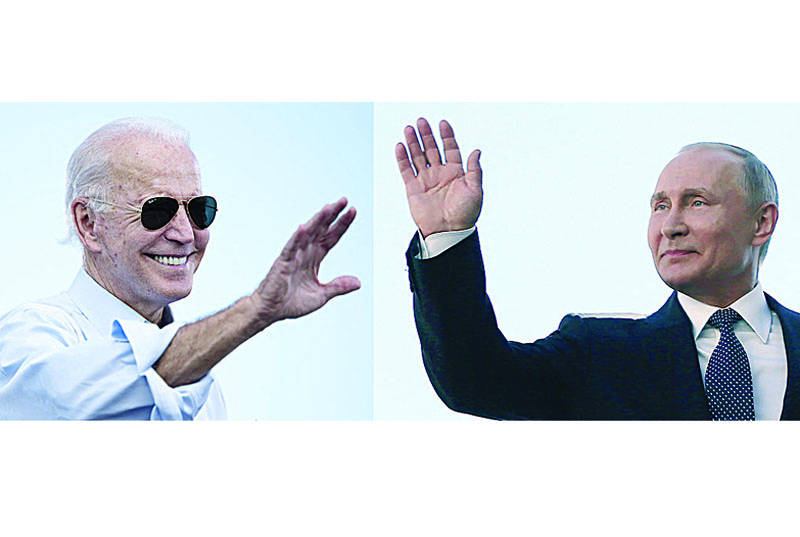SAINT PETERSBURG: Russian President Vladimir Putin said Friday he hoped to improve deeply damaged relations with the United States when he holds his first summit with US counterpart Joe Biden later this month. The face-to-face meeting in Geneva on June 16 comes amid the biggest crisis in ties between the two countries in years, with tensions high over a litany of issues including hacking allegations, human rights and claims of election meddling.
"We need to find ways to regularise these relations," Putin told the Saint Petersburg International Economic Forum, adding that bilateral ties are currently at a "low level". Usually joined at the forum's main session by other world leaders, the Russian president was alone on the stage on Friday with a moderator and Austrian Chancellor Sebastian Kurz and Sheikh Tamim bin Hamad Al-Thani, the emir of Qatar, participating via videolink.
"We have no disagreements with the United States," Putin said. "They only have one disagreement: they want to hold back our development, they talk about it publicly." Speaking to Russia's Channel One television later in the day, Putin said he did not expect any breakthrough in Geneva but said it would be good to discuss topics of mutual interest.
"I expect a positive result," said Putin, 68. The two previously met in 2011, when Biden served as vice president and Putin was prime minister. Putin said he remembered that meeting, praising the 78-year-old US leader as a "very experienced" and "careful" politician. Since taking office in January, Biden has ramped up pressure on the Kremlin, and his comments likening Putin to a "killer" were met with fierce criticsm in Moscow.
'That's nonsense'
The Biden administration imposed new sanctions over what US authorities say was Russia's role in the massive SolarWinds cyber attack and alleged meddling in the 2020 presidential election. Biden said he is also "looking" at possible retaliation after the White House linked Russia to a cyberattack against global meat processing giant JBS. Putin said on Friday that those claims were "risible". "I've heard about some meat processing plant. That's nonsense," he said.
"I think US security services should establish who this blackmailer is. Not Russia for sure," Putin added. Washington has also harshly criticised Moscow for the near-death poisoning and subsequent imprisonment of Kremlin critic Alexei Navalny. Putin on Friday signed a law barring "extremist" groups from participating in parliamentary elections, with a court in Moscow holding a hearing next week as it considers whether to assign the label to Navalny's organisations.
Critics have denounced the law as the latest move to crack down on Russia's opposition ahead of elections in September for Russia's lower house State Duma. The diplomatic crisis with the United States has resulted in a mutual expulsion of diplomats, with Moscow prohibiting the US embassy from employing foreign nationals, practically halting its consular services.
Putin vaunted at the forum that the first line of the controversial Nord Stream 2 gas pipeline to Germany has been completed, despite strong US opposition. The United States and several European countries have deeply opposed the construction of the pipeline, arguing that it will increase European dependence on Russia for critical gas supplies and increase Moscow's geopolitical clout.
'Difficult point'
Putin also suggested that European nations should pay for Russian gas in euros, rather than dollars, part of a wider effort by Moscow to reduce its reliance on the dollar. Markus Ederer, the EU ambassador to Russia, said at the forum on Thursday that Moscow's relations with the European Union were also at "the most difficult point" since the Cold War.
"If you listen to what Sergei Lavrov says, you can come to the conclusion that Russia doesn't value relations with the EU," the German diplomat added, referring to Russia's foreign minister. The Saint Petersburg International Forum, often referred to as Russian Davos, is the country's main showcase for investors and brings together business and political leaders. It is one of the largest offline events held in Russia and the world since the outbreak of the coronavirus pandemic, although the number of participants was restricted to 5,000, nearly four times fewer than when it was last held in 2019. - AFP



